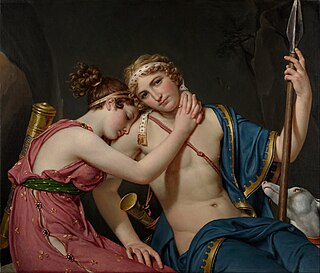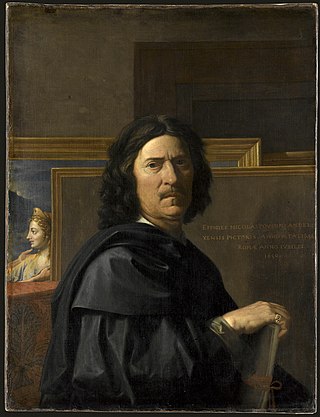After the Deluge may refer to:
A car is a wheeled motor vehicle used for transporting passengers.
A bed is a piece of furniture which is used as a place to sleep, rest, and relax.
A kiss is a touch with the lips, usually to express love or affection, or as part of a greeting.
A deluge is a large downpour of rain, often a flood.
A dream is a succession of images, ideas, emotions, and sensations that usually occur involuntarily in the mind during certain stages of sleep.
Ryan may refer to:
Potop may refer to:

Eucharis, who does not appear in Greek mythology, was one of the nymph Calypso's attendants in Fénelon's novel Les Aventures de Télémaque (1699). In Fénelon's modern prose epic, an improvisation upon Homeric themes, Telemachus while searching for his father, Odysseus, has been shipwrecked on Ogygia, Calypso's island, and there has fallen in love with Eucharis but must leave her, dutifully to pursue his quest.
The Lovers is a trump or "Major Arcana" tarot card.

The Cosquer Cave is located in the Calanque de Morgiou in Marseille, France, near Cap Morgiou. The entrance to the cave is located 37 m (121 ft) underwater, due to the Holocene sea level rise. The cave contains various prehistoric rock art engravings. Its submarine entrance was discovered in 1985 by Henri Cosquer, a professional diver. The underwater passage leading to the cave was progressively explored until 1990 by cave divers without the divers being aware of the archaeological character of the cave. It is only in the last period (1990–1991) of the progressive underwater explorations that the cave divers emerged in the non-submerged part of the cave. The prehistoric paintings were not immediately discovered by the divers to first emerge from the other side of the sump. The cave was named after Henri Cosquer, when its existence was made public in 1991, after three divers became lost in the cave and died.

André Fontaine was a French historian and journalist. He started working at Temps Présent, and then was director at Le Monde in 1947, at the official beginning of the Cold War. He became the newspaper's editor from 1969 to 1985, and director from 1985 to 1991. As of February 2007 he was still contributing articles to the paper. André Fontaine is famous for his historical thesis, according to which the Cold War in fact started as soon as 1917 with the cordon sanitaire policy.
The seven deadly sins is a classification of vices used in Christian teachings.
A concert is a form of musical performance.
Raison d'être is a Swedish dark ambient project formed by Peter Andersson. The name of the band was taken from a sentence in a book by Carl Gustav Jung: "the individuation is the raison d’être of the self". Dark ambient atmospheres, drone elements, industrial sounds, ecclesiastical hymns are all blended together to constitute the music of Raison d'être.
André Valmy was a French film actor. He was born André Antoine Marius Dugenet in the 14th arrondissement of Paris. He appeared in more than 60 films between 1940 and 2001. He is also known in France to be the dubbed voice of Walter Matthau, Robert Shaw and George Kennedy.

The Four Seasons was the last set of four oil paintings completed by the French painter Nicolas Poussin (1594–1665). The set was painted in Rome between 1660 and 1664 for the Duc de Richelieu, the grand-nephew of Cardinal Richelieu. Each painting is an elegiac landscape with Old Testament figures conveying the different seasons and times of the day. Executed when the artist was in failing health suffering from a tremor in his hands, the Seasons are a philosophical reflection on the order in the natural world. The iconography evokes not only the Christian themes of death and resurrection but also the pagan imagery of classical antiquity: the poetic worlds of Milton's Paradise Lost and Virgil's Georgics. The paintings currently hang in a room on their own in the Louvre in Paris.
By his absolute humility, by his effacement of himself, by his refusal to use any tricks or overstate himself, Poussin has succeeded in identifying himself with nature, conceived as a manifestation of the divine reason. The Seasons are among the supreme examples of pantheistic landscape painting.
Jamais peut-être, dans toute la peinture occidentale, des choses aussi nombreuses et parfois si difficiles n'avaient été dites avec une telle simplicité. Jamais un peintre ne s'était aussi pleinement identifié à l'ordre du monde. Mais cette identification n'est ni « une projection » ni une confidence : là est le sens de cette impersonalité que l'on a pu reprocher à Poussin, et qui fait sa grandeur.
"Après moi, le déluge" is a French expression attributed to King Louis XV of France, or in the form "Après nous, le déluge" to Madame de Pompadour, his favourite. It is generally regarded as a nihilistic expression of indifference to whatever happens after one is gone. Its meaning is translated by Brewer in the forms "When I am dead the deluge may come for aught I care", and "Ruin, if you like, when we are dead and gone."
The Return of the Prodigal Son is a parable of Jesus in the Bible.

Alexandre Beaupain, is a French singer and composer, both of his own songs, and of the music and songs for films, particularly those directed by Christophe Honoré. He has released several albums and received awards, both for film scores and the song albums.
Survivants means survivors in French. Survivants, Survivantes, Survivante, Survivant, or, variant, may refer to: